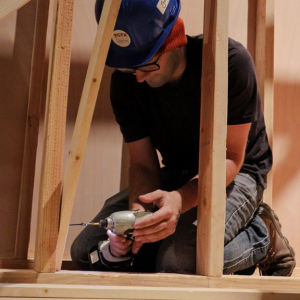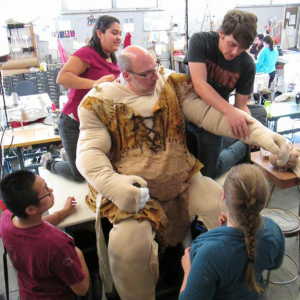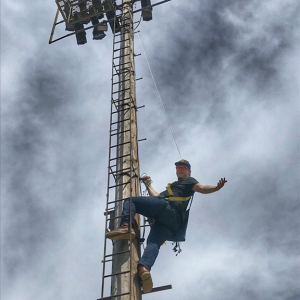- Identify the roles of the various members of the costume department.
- Identify and follow safety guidelines in the costume shop.
- Demonstrate basic hand sewing techniques for costume construction, maintenance, and repair.
- Demonstrate basic machine sewing techniques for costume construction, maintenance, and repair.
- Demonstrate basic knowledge of costume shop equipment.
First Year Technical Training
First Year Technical Training
At PCPA we believe every space is a classroom from your time in individual shops to crew positions on the productions. We are training you to be the best you can be in all areas of Technical Theatre. In the first year, the students create building blocks from which they grow throughout their two-year experience. All students start at the same level in all eight areas of technical theatre by learning terminology and basic skills, as well as portfolio and professionalism.
Costumes
Drafting
- Identify, interpret, and create various line styles and line weights.
- Accurately use an architectural scale ruler to create and interpret drawings using architectural scale.
- Learn how to create easily readable lettering to notate and dimension drawings.
- Learn how to properly notate and dimension drawings using industry standards
- Learn how to interpret and develop drawings using industry-standard notation systems, visual styles, and page layout.
Electrics
- Identify lighting terminology and how it is used.
- Understand the basics of electricity as it applies to lighting instruments for the theatre.
- Identify lighting instruments from the PCPA inventory.
- Demonstrate how to hang, circuit, focus and troubleshoot a lighting instrument.
- Recognize different wires, cables, gauges, and connectors.
- Practice soldering by soldering 2 wires together.
- Interpret lighting paperwork and better understand its use.
Scenic Art
- Identify the basic tools of scenic painting, and know how to care for them.
- Recognize which tool to use for different steps in the painting process.
- Know the 12 principle hues and recognize their use in the scenic painting studio.
- Use Paint primaries and color theory to mix colors for a color wheel of the 12 principle hues.
- Compare swatches of color and recognize, identify and discuss the hue, value, and chroma.
- Acquire basic paint techniques most often used in the painting of scenery in a theater.
- Define layout and cartooning.
- Describe the three types of tools of layout and cartooning.
Props
- Define and discuss what props are and different construction techniques.
- Identify the proper way to analyze a script.
- Understand how to do research and use a library.
- Identify time management techniques.
- Demonstrate time management abilities.
- Identify and demonstrate proper use of glues and adhesives.
- Identify different types of furniture, upholstery, and foam.
Scenic Construction
- Identify and safely use the stationary tools in the scene shop.
- Identify and understand the usage of the common hand tools.
- Identify and understand the proper usage of hardware, dimensional lumber, and sheet lumber.
- Gain a higher level of understanding of the standards and practices used for the construction of scenery.
- Identify structural components and their terminology.
- Employ critical thinking and essential problem-solving skills.
- Utilize fundamental shop math skills.
Sound
- Implement new vocabulary and means of communication for sound in a theatre.
- Obtain an understanding of the signal flow of a fundamental sound system.
- Demonstrate best practices for keeping a safe working environment.
- Gain Skills in QLab programming and operation.
- Participate in an intermediate level of specialized training for live audio technical roles.
Stage Management
- Illustrate different elements of Stage Management.
- Recognize skills to be advocates for themselves, as well as others.
- Develop skills in how to set up pre-production processes.
- Practice skills to become better collaborators in rehearsal and performances.
- Create paperwork needed for communication.
- Practice skills needed for the rehearsal room.
- Acquire knowledge of online resources used by Stage Managers and theaters.
Portfolio and Professionalism
- Understand and maintain a willingness to accept and solicit feedback.
- Practice self-analysis and evaluation of their own execution of techniques and skills acquired throughout the learning process.
- Demonstrate best practices for keeping a safe working environment.
- Develop abilities to problem solve and adapt to challenging situations.
- Acquire communication skills.
- Recognize the basic principles, techniques, and challenges of script analysis.
- Develop analytical abilities.
- Identify the parts of a Technicians resume, including 3 references.
- Develop a template for their resume and create a proper Technicians resume with their personal experiences.
- Identify and demonstrate how to take proper photos of their work and their work processes.
- Describe and explain their work and work processes with proper terminology and with positive language.
- Recognize what a brand is and how to create a personal brand.
- Develop and implement a personal brand.
- Identify the parts of a website for professional purposes.


